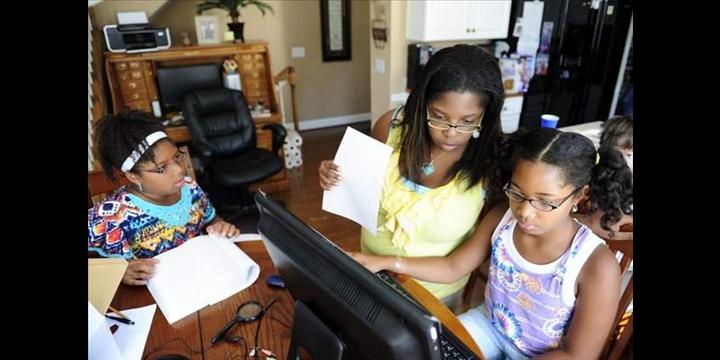By Chas Sisk, The TennesseanEster Bradford digs into the cases stuffed into a corner of her livingroom. She pulls out rock samples, tempera paints, a tambourine."Iwas just shocked by the amount of stuff. When the UPS man kept bringingboxes and boxes and boxes, I was like, OK," she says, chuckling.Itwas seven boxes in all, not counting the two that contained a newcomputer and printer - enough books, science materials, art supplies andother provisions for a parent to teach two elementary school studentsat home for a year.They are part of Tennessee's newest education experiment, a school run entirely online and open to students statewide.Theschool, known as the Tennessee Virtual Academy, combines elements ofhome schooling with the requirements of a public school and the emergingfield of distance learning. But only six weeks after it was launched,the school has plenty of critics.The Tennessee Virtual Academytakes advantage of a state law that went into effect July 1 that allowsdistricts to set up "virtual schools" open to any student in the state. Funding comes entirely from state tax dollars, at no cost to the districts or parents.TheTennessee Virtual Academy was officially launched last month by UnionCounty Public Schools, a 3,000-student district in East Tennessee. K12Inc., a Virginia-based education company, has been hired to operate theonline school.About 2,100 students have signed up, includingBradford's two daughters. The Goodlettsville mother says the school is avast improvement over her previous home-schooling program. Lessons aretougher, are structured well and offer her daughters the chance to domore online.The Tennessee Virtual Academy also will save Bradfordhundreds of dollars a year in curricula and school supplies. With thosecosts eliminated, many other parents who previously did not home-schoolcould be drawn to leave their local districts for schools online."Homeschools have, in the past, not had their expenses paid by the state,"said Jerry Winters, director of government relations for the TennesseeEducation Association, which represents public school teachers. "Shouldthe state be paying a for-profit company to be educating kids at akitchen table on a computer?"Proponents, however, say virtualschools are less costly and supplement the options already available toparents, including private, magnet, charter and traditional publicschools."It's another option. It's another choice," said Jeff Kwitowski, a spokesman for K12.h3>Fast startearningsof $21.5 million last year on revenue of$384.5 million. The company hasbeen in operation since 2000 and has set up online schools like theTennessee Virtual Academy in 29 states. K12 also offers other distancelearning services.The Tennessee Virtual Academy helped Rachel Gossett pull her two daughters out of their home district in VanBuren County. The two girls, now in the fifth and 10th grades, werebeing bullied at school, and the younger had tested below basic in mathlast spring, despite earning high grades during the school year.Hadthe Tennessee Virtual Academy not started this year, Gossett's bestalternative for her fifth-grade daughter would have been a narrower,$20-a-month home school curriculum that still would have left herspending regularly on supplies, she said."Being a low-incomefamily, $20 per month could be a major hit," she said. "Free is alwaysgood. That was definitely one of the main things."h3>Strings attached
newest education experiment, a school run entirely online and open to students statewide.Theschool, known as the Tennessee Virtual Academy, combines elements ofhome schooling with the requirements of a public school and the emergingfield of distance learning. But only six weeks after it was launched,the school has plenty of critics.The Tennessee Virtual Academytakes advantage of a state law that went into effect July 1 that allowsdistricts to set up "virtual schools" open to any student in the state. Funding comes entirely from state tax dollars, at no cost to the districts or parents.TheTennessee Virtual Academy was officially launched last month by UnionCounty Public Schools, a 3,000-student district in East Tennessee. K12Inc., a Virginia-based education company, has been hired to operate theonline school.About 2,100 students have signed up, includingBradford's two daughters. The Goodlettsville mother says the school is avast improvement over her previous home-schooling program. Lessons aretougher, are structured well and offer her daughters the chance to domore online.The Tennessee Virtual Academy also will save Bradfordhundreds of dollars a year in curricula and school supplies. With thosecosts eliminated, many other parents who previously did not home-schoolcould be drawn to leave their local districts for schools online."Homeschools have, in the past, not had their expenses paid by the state,"said Jerry Winters, director of government relations for the TennesseeEducation Association, which represents public school teachers. "Shouldthe state be paying a for-profit company to be educating kids at akitchen table on a computer?"Proponents, however, say virtualschools are less costly and supplement the options already available toparents, including private, magnet, charter and traditional publicschools."It's another option. It's another choice," said Jeff Kwitowski, a spokesman for K12.h3>Fast startearningsof $21.5 million last year on revenue of$384.5 million. The company hasbeen in operation since 2000 and has set up online schools like theTennessee Virtual Academy in 29 states. K12 also offers other distancelearning services.The Tennessee Virtual Academy helped Rachel Gossett pull her two daughters out of their home district in VanBuren County. The two girls, now in the fifth and 10th grades, werebeing bullied at school, and the younger had tested below basic in mathlast spring, despite earning high grades during the school year.Hadthe Tennessee Virtual Academy not started this year, Gossett's bestalternative for her fifth-grade daughter would have been a narrower,$20-a-month home school curriculum that still would have left herspending regularly on supplies, she said."Being a low-incomefamily, $20 per month could be a major hit," she said. "Free is alwaysgood. That was definitely one of the main things."h3>Strings attached



